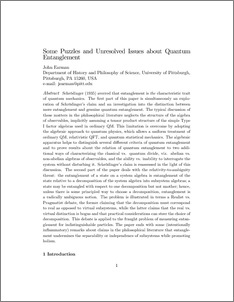Earman, John
(2014)
Some Puzzles and Unresolved Issues About Quantum
Entanglement.
Erkenntnis.
ISSN ISSN 0165-0106
![[img]](https://philsci-archive.pitt.edu/style/images/fileicons/application_pdf.png)  Preview |
|
PDF
Puzzles_about_Entanglement_Final_Endnotes.pdf
- Accepted Version
Download (307kB)
|
Abstract
Schrödinger (1935) averred that entanglement is the characteristic trait of quantum mechanics. The first part of this paper is simultaneously an exploration of Schrödinger's claim and an investigation into the distinction between mere entanglement and genuine quantum entanglement. The typical discussion of these matters in the philosophical literature neglects the structure of the algebra of observables, implicitly assuming a tensor product structure of the simple Type I factor algebras used in ordinary QM. This limitation is overcome by adopting the algebraic approach to quantum physics, which allows a uniform treatment of ordinary QM, relativistic QFT, and quantum statistical mechanics. The algebraic apparatus helps to distinguish several different criteria of quantum entanglement and to prove results about the relation of quantum entanglement to two additional ways of characterizing the classical vs. quantum divide, viz. abelian vs. non-abelian algebras of observables, and the ability vs. inability to interrogate the system without disturbing it. Schrödinger's claim is reassessed in the light of this discussion. The second part of the paper deals with the relativity-to-ambiguity threat: the entanglement of a state on a system algebra is entanglement of the state relative to a decomposition of the system algebra into subsystem algebras; a state may be entangled with respect to one decomposition but not another; hence, unless there is some principled way to choose a decomposition, entanglement is a radically ambiguous notion. The problem is illustrated in terms a Realist vs. Pragmatist debate, the former claiming that the decomposition must correspond to real as opposed to virtual subsystems, while the latter claims that the real vs. virtual distinction is bogus and that practical considerations can steer the choice of decomposition. This debate is applied to the fraught problem of measuring entanglement for indistinguishable particles. The paper ends with some (intentionally inflammatory) remarks about claims in the philosophical literature that entanglement undermines the separability or independence of subsystems while promoting holism.
Monthly Views for the past 3 years
Monthly Downloads for the past 3 years
Plum Analytics
Altmetric.com
Actions (login required)
 |
View Item |



